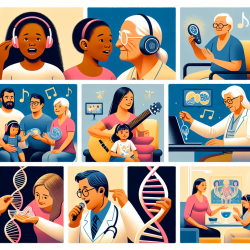Introduction
In the dynamic field of speech-language pathology, leveraging data to drive decisions can significantly enhance the outcomes for children. The recently published research titled "Harmonized Database of Western U.S. Water Rights (HarDWR) v.1" offers valuable insights that can be translated into our practice. Although the study focuses on water rights, its methodological rigor and data harmonization principles can guide us in optimizing our therapy services at TinyEYE.
Key Takeaways from the Research
The HarDWR study meticulously harmonized water rights data from 11 Western U.S. states, addressing inconsistencies in data formats, terminology, and definitions. This harmonization enabled a comprehensive, region-wide analysis of water needs and shortfalls. For speech-language pathologists, this approach underscores the importance of standardized data collection and integration for effective analysis and decision-making.
Implementing Data-Driven Strategies in Speech-Language Pathology
Here are actionable steps inspired by the HarDWR study to improve your practice:
- Standardize Data Collection: Develop a unified framework for collecting and recording therapy data across different cases. This could include standardized assessment tools, progress tracking formats, and outcome measures.
- Harmonize Terminology: Ensure consistent use of terminology across your practice. This can involve creating a glossary of terms and definitions that all team members adhere to, facilitating clearer communication and more accurate data analysis.
- Utilize Data for Comprehensive Analysis: Integrate data from various sources to conduct thorough analyses. This could involve combining assessment scores, therapy session notes, and progress reports to identify trends and inform treatment adjustments.
- Adopt a Collaborative Approach: Engage with other professionals, such as educators and healthcare providers, to gather diverse data points. This holistic view can enhance your understanding of each child's needs and inform more effective interventions.
Encouraging Further Research
While implementing these strategies can significantly improve your practice, ongoing research is crucial. Consider conducting your own studies to explore the impact of data-driven decisions on therapy outcomes. Collaborate with academic institutions or join professional networks to stay updated on the latest research and methodologies.
Conclusion
By embracing data-driven strategies and fostering a culture of continuous improvement, we can create better outcomes for children in speech-language pathology. The HarDWR study serves as a reminder of the power of data harmonization and standardization, principles that are equally applicable in our field.
To read the original research paper, please follow this link: Harmonized Database of Western U.S. Water Rights (HarDWR) v.1.










